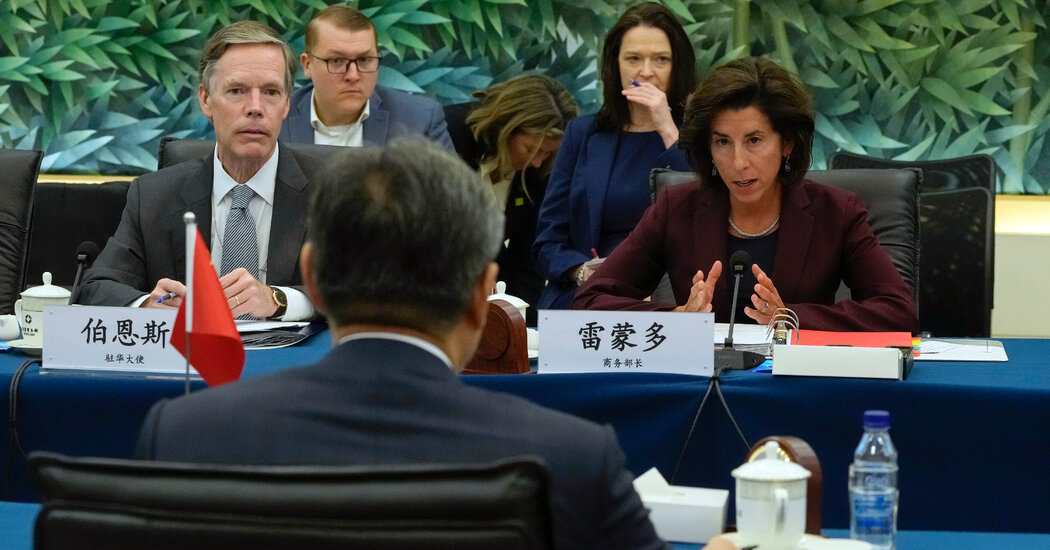The United States and China agreed on Monday to hold regular talks on trade issues and restrictions on access to advanced technology, in the latest move this summer toward easing tensions between the world’s two largest economies.
The announcement came during a visit to Beijing by US Commerce Secretary Gina Raimondo, who is meeting with senior Chinese officials in Beijing and Shanghai this week.
The agreement to hold regular discussions is the latest step toward rebuilding the frayed ties between the two countries, a process that has already begun during three trips in the past 10 weeks by senior US officials: Secretary of State Antony Blinken, Treasury Secretary Janet L. Yellen and John Kerry, the President’s Climate Envoy.
“I think it’s a very good sign that we’ve agreed to a concrete dialogue, I would say, more than just some kind of vague commitment to keep talking, it’s a formal channel,” Ms. Raimondo said in an interview after four hours of negotiations. With Chinese Minister of Commerce Wang Wentao.
Bilateral talks on trade, technology and other economic issues used to be the norm between the United States and China, but those discussions have atrophied in recent years. China suspended eight bilateral discussion groups a year ago in response to a visit to Taiwan by Representative Nancy Pelosi, a California Democrat who was the speaker of the House at the time.
The flight of a Chinese spy balloon that traveled across the United States and was then shot down over the Atlantic Ocean last winter only served to deepen divisions between China and the United States, and led Mr. Blinken to initially cancel a trip to Beijing.
But relations began to improve as the two countries, whose economies are linked to each other, opened the door to the resumption of diplomatic relations.
Ms. Raimondo said Monday night that she had an “open” and “hands-on” discussion with Mr. Wang, and that she had raised the US business community’s concerns about China’s recent actions against Intel and Micron Technology, two US-based semiconductor companies. States. This summer, the Chinese government thwarted a major acquisition planned by Intel and halted sales of Micron in China.
She said that two separate dialogues would be established: one would be a working group that would include representatives of the business sector and focus on trade issues. The other is the exchange of government information on export controls.
Ms. Raimondo also said that she and the Chinese Minister of Commerce agreed to meet with each other at least annually.
She said the new Dialogue on Technology Controls was set up to share more information about US export restrictions on advanced technology, but said this did not mean the US would make concessions on national security issues. The first meeting of the export control group is scheduled to be held in Beijing on Tuesday.
Some Republicans have criticized the idea of creating a working group, calling it “inappropriate” for the Biden administration to discuss national security policy with China.
Ms. Raimondo said she spoke to nearly 150 business leaders in preparation for her trip and that they gave her a common message: We need more channels of communication.
“A growing Chinese economy that plays by the rules is in all of our interests,” she said.
Michael Hart, president of the American Chamber of Commerce in China, also welcomed the bilateral talks. “There was not enough interaction between the governments,” he said.
He added that there has been a change of direction on the part of Chinese officials this summer, with an increased willingness to hold discussions.
“It used to be that in every meeting I went to, the first five minutes would be, ‘It’s all America’s fault,'” Hart said. “It’s certainly been toned down now that government officials understand the importance of trade between the United States and China.”
